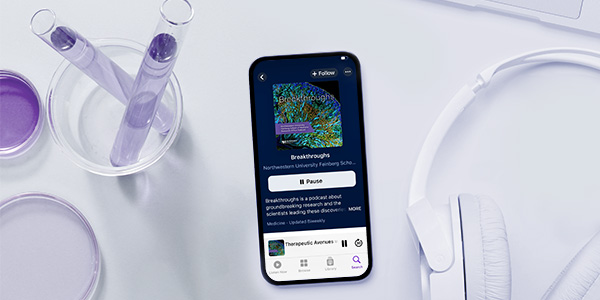Media Coverage
The work done by Northwestern University Feinberg School of Medicine faculty members (and even some students) is regularly highlighted in newspapers, online media outlets and more. Below you’ll find links to articles and videos of Feinberg in the news.
-
BBC
–
They contracted hepatitis before the vaccine was given at birth – now the shot may be delayed again
The US has now returned to a time where vaccinations against hepatitis B are no longer recommended for all newborns.
Some public health experts and those living with hepatitis B say the move is a regression that could risk exposing all children to a virus that has become much less common because of vaccines.
“Evidence shows that even a two-month delay in administering the hepatitis B vaccine can result in hundreds of additional deaths from liver disease and liver cancer as those children age,” said Claudia Hawkins, director for the Center for Global Communicable and Emerging Infectious Diseases at Northwestern University’s Feinberg School of Medicine.
-
US News & World Report
–
Germophobes Can Breathe Easy On Airplanes, In Hospitals, Experts Say
The ambient air on planes and in hospitals mostly contains harmless microbes typically associated with human skin, researchers reported Dec. 4 in the journal Microbiome.
The cutting-edge study analyzed germ samples captured on the outer surface of face masks worn by air travelers and health care workers, researchers said.
“We realized that we could use face masks as a cheap, easy air-sampling device for personal exposures and general exposures,” senior researcher Erica Hartmann, an associate professor of civil and environmental engineering at Northwestern University in Evanston, Illinois, said in a news release.
-
US News & World Report
–
White House Says Trump’s Imaging Looks Normal; Doctors Question the Testing
The White House released new medical information about President Donald Trump on Monday, saying recent imaging tests showed he is in “excellent overall health.” But some medical experts say the notice raised more questions than answers.
Dr. Jeffrey Linder, chief of general internal medicine at Northwestern University’s Feinberg School of Medicine in Chicago, said the memo left him confused.
“There is nothing standard about an executive physical,” he told The Times. He added: “There is no medical specialty that recommends that an otherwise asymptomatic individual get imaging.”
-
TIME
–
How Clean Is Airplane Air, Really?
Just in time for the busy holiday travel season, researchers report on a question that will run through many people’s minds as they cram into tightly packed planes: How clean is airplane air?
To find out, Erica Hartmann, associate professor in the department of civil and environmental engineering at Northwestern University, and her colleagues tested face masks worn by passengers on flights to log what kinds of bugs these products trapped. The team was also interested in the air circulating in hospitals, another public place where germs commonly spread, and tested face masks worn by hospital personnel.
-
Chicago Tribune
–
After 3 years of ChatGPT, it’s clear Illinois needs more AI safeguards
Three years ago, ChatGPT entered our world and changed the way many of us interact with our phones, computers, work and life in general. What began as a fun novelty essentially kick-started an artificial intelligence boom. Today, numerous AI tools are embedded in research, classrooms, hospitals, law firms and other industries, promising efficiency and creativity. As we mark this anniversary, we must ask: At what cost and at whose expense do we realize this efficiency and creativity?
This is an op-ed written by Kristi Holmes, director of the Galter Health Science Library at Northwestern University Feinberg School of Medicine, and Mohammad Hosseini, assistant professor of Preventive Medicine.
-
BBC
–
White House doctor says Trump’s cardiovascular imaging ‘perfectly normal’
US President Donald Trump “remains in excellent overall health” after undergoing a “comprehensive executive physical”, according to his White House physician.
Dr Jeffrey A Linder, chief of general internal medicine at Northwestern University Feinberg School of Medicine, highlighted that Barbabella’s memo did not specify whether an MRI or computed tomography (CT) scan was performed, making it difficult to know exactly what was done.He said routine anatomical imaging – whether MRI or CT – was generally discouraged in asymptomatic patients because the potential risks outweighed the benefits.
-
New York Times
–
Memo From Trump’s Doctor Cites ‘Excellent’ Scan but Offers Little Clarity
The White House released a letter from President Trump’s physician on Monday about the results of “advanced imaging tests.” The statement, by Dr. Sean P. Barbabella, said the tests on his cardiovascular system and abdominal region showed the president “remains in excellent overall health.”
Dr. Jeffrey A. Linder, chief of general internal medicine at Northwestern University’s Feinberg School of Medicine, said he found the White House statement confusing.
“There is nothing standard about an executive physical,” he said. No standards exist and what tests are included can vary widely.
-
CBS Chicago
–
Northwestern study recommends new lung cancer screening guidelines
A new study from Northwestern is offering new recommendations on lung cancer screenings. Kalvin Lung, MD, assistant professor of surgery in the Division of Thoracic Surgery, discusses the US Preventive Services Task Force guidelines and the Lung Health Center at Northwestern Medicine to provide screening for anyone over the age of 21 years old.
-
Washington Post
–
Why screening for the deadliest cancer in the U.S. misses most cases
Under current recommendations, people are eligible for screening if they are 50 to 80 years old and have a history of heavy smoking, either actively or in the past 15 years. But those guidelines exclude a large number of people who could have their cancer detected earlier, according to a new study published Thursday in JAMA Network Open, a peer-reviewed journal.
“A majority of the lung cancer patients in this country would not meet the screening criteria as it exists currently,” said Ankit Bharat, the study’s lead author and executive director of the Canning Thoracic Institute at Northwestern Medicine. “If we have a more broader screening program, similar to breast and colon, then we would be able to detect substantially more patients at earlier stage.”
-
Forbes
–
Just How Different Are Women’s And Men’s Brains? It’s Complicated
Speaking at Neuroscience 2025, the Society for Neuroscience’s annual conference, Dr. Catherine S. Woolley addressed the topic with a presentation titled, “Sex Differences in the Brain are Misunderstood.” As the title suggests, our popular conceptions about male and female brains could stand some rethinking.
Dr. Woolley, a neuroendocrinologist from Northwestern University who specializes in molecular neuroscience, sketched a helpful way to think about the topic, starting with a broader, macro view and gradually moving toward a more nuanced micro view.






